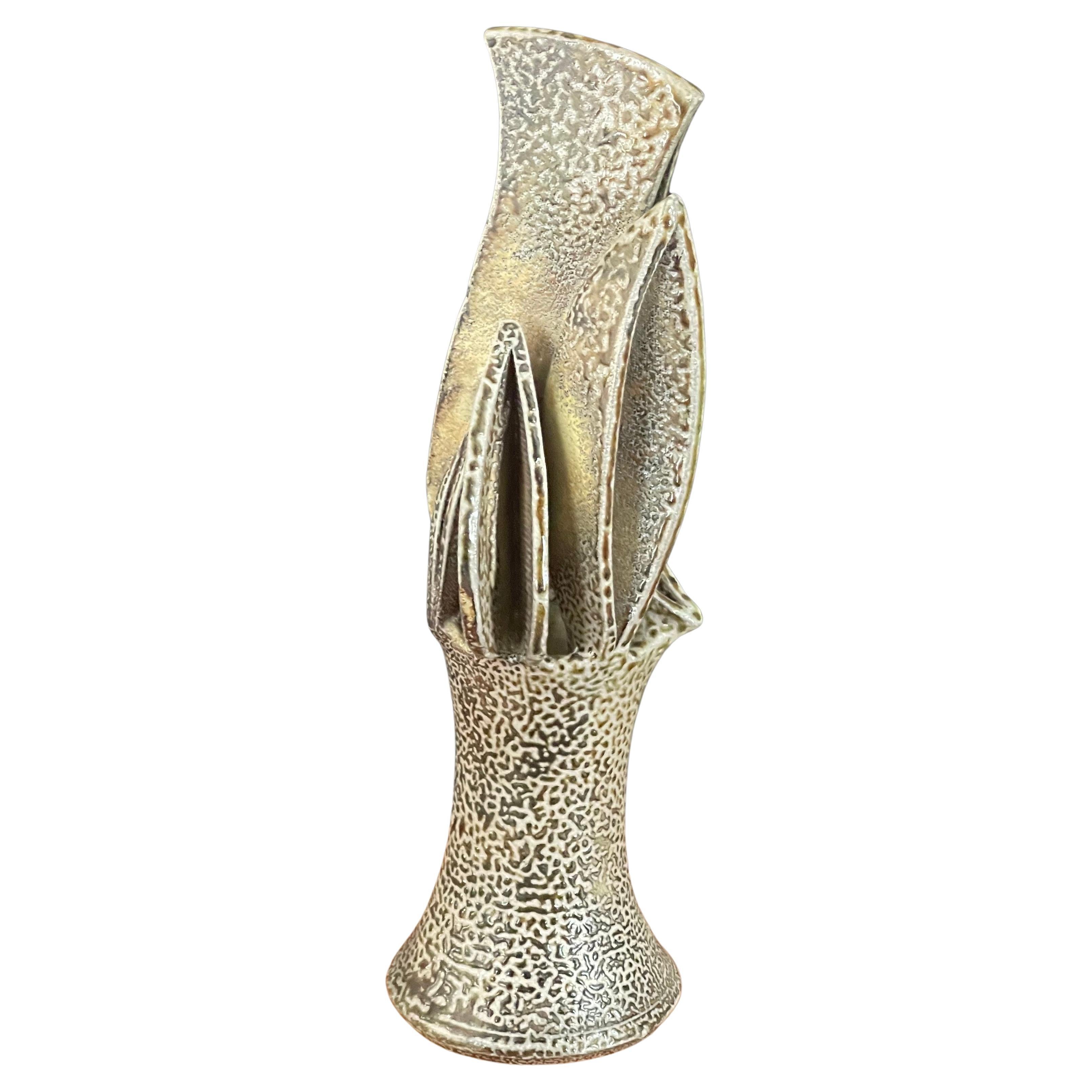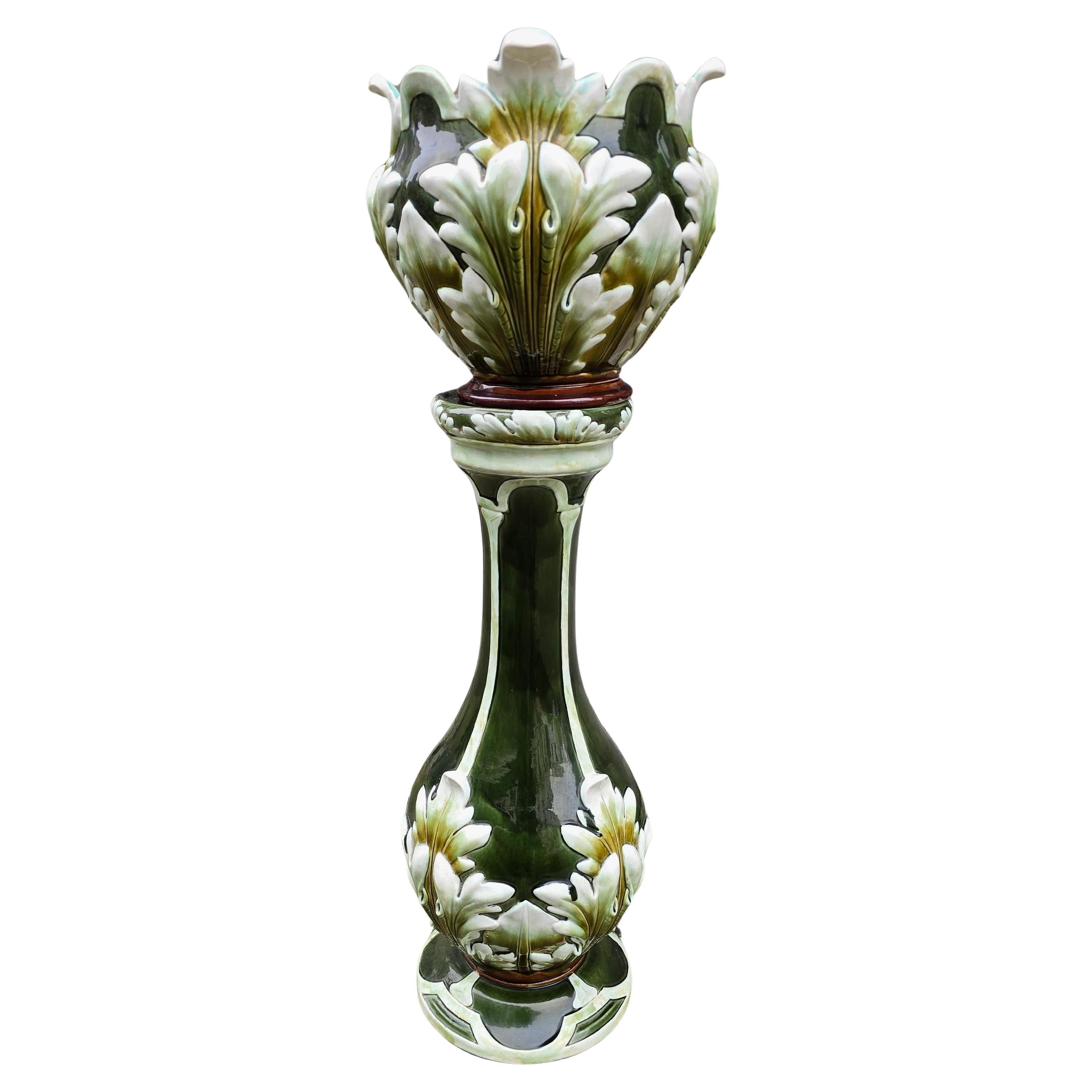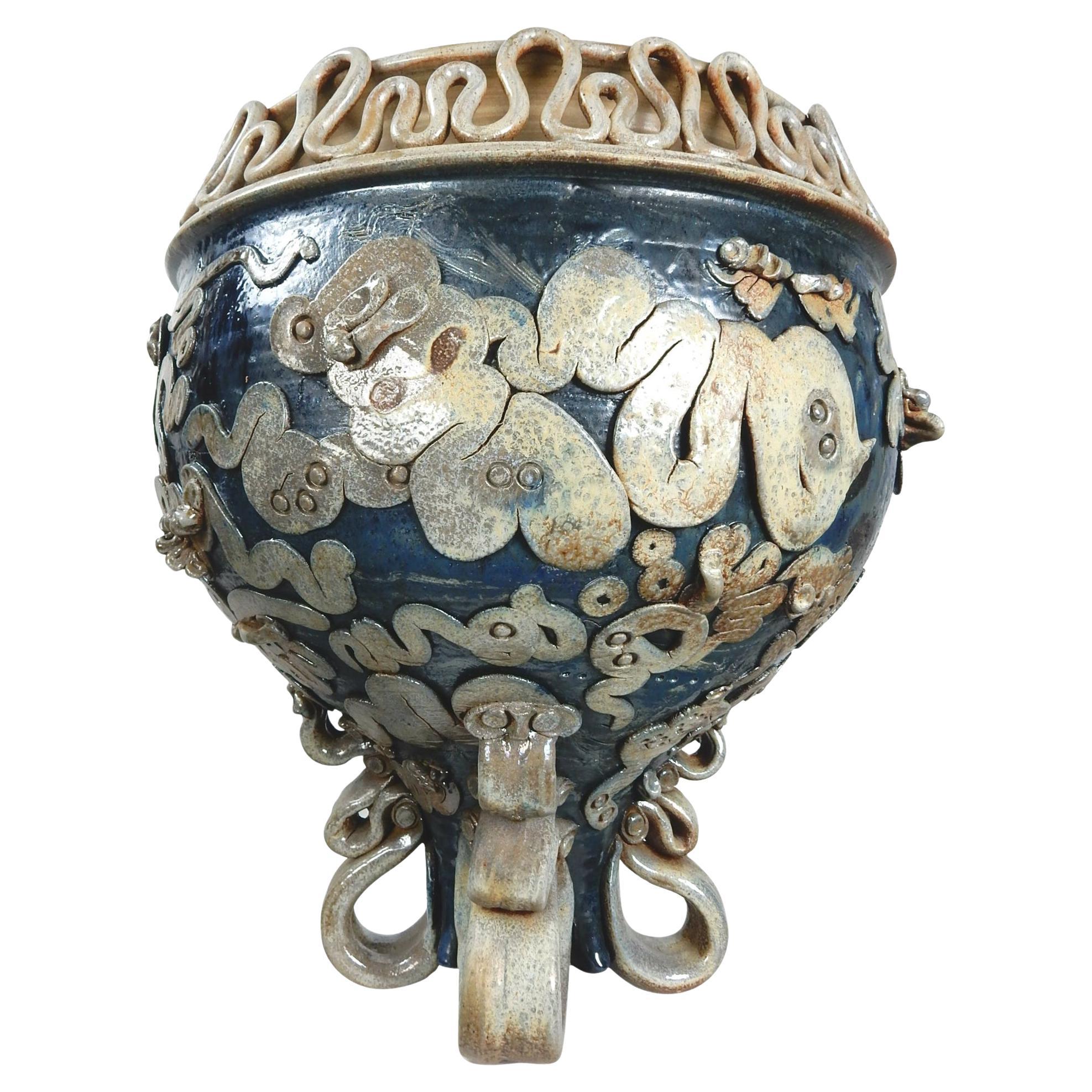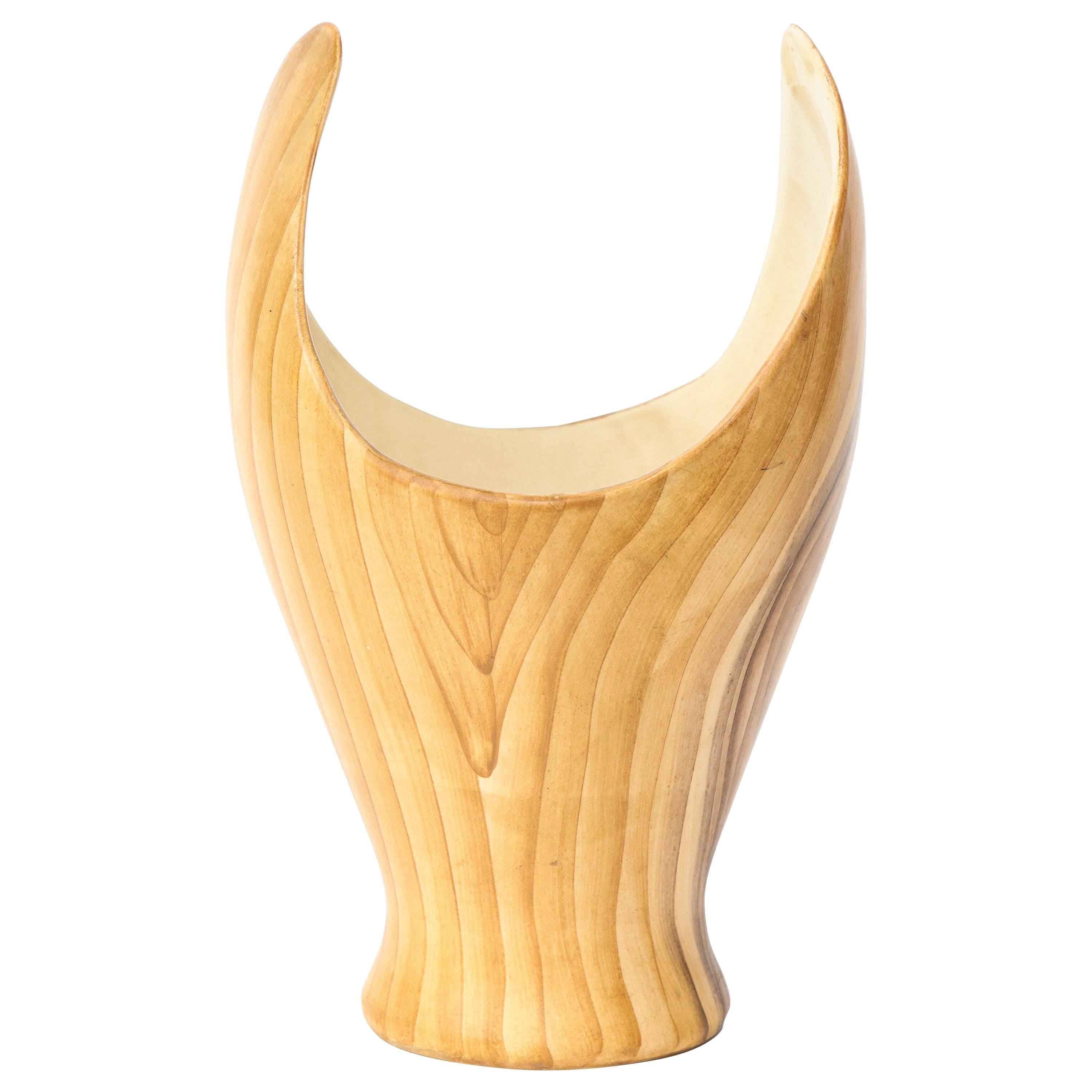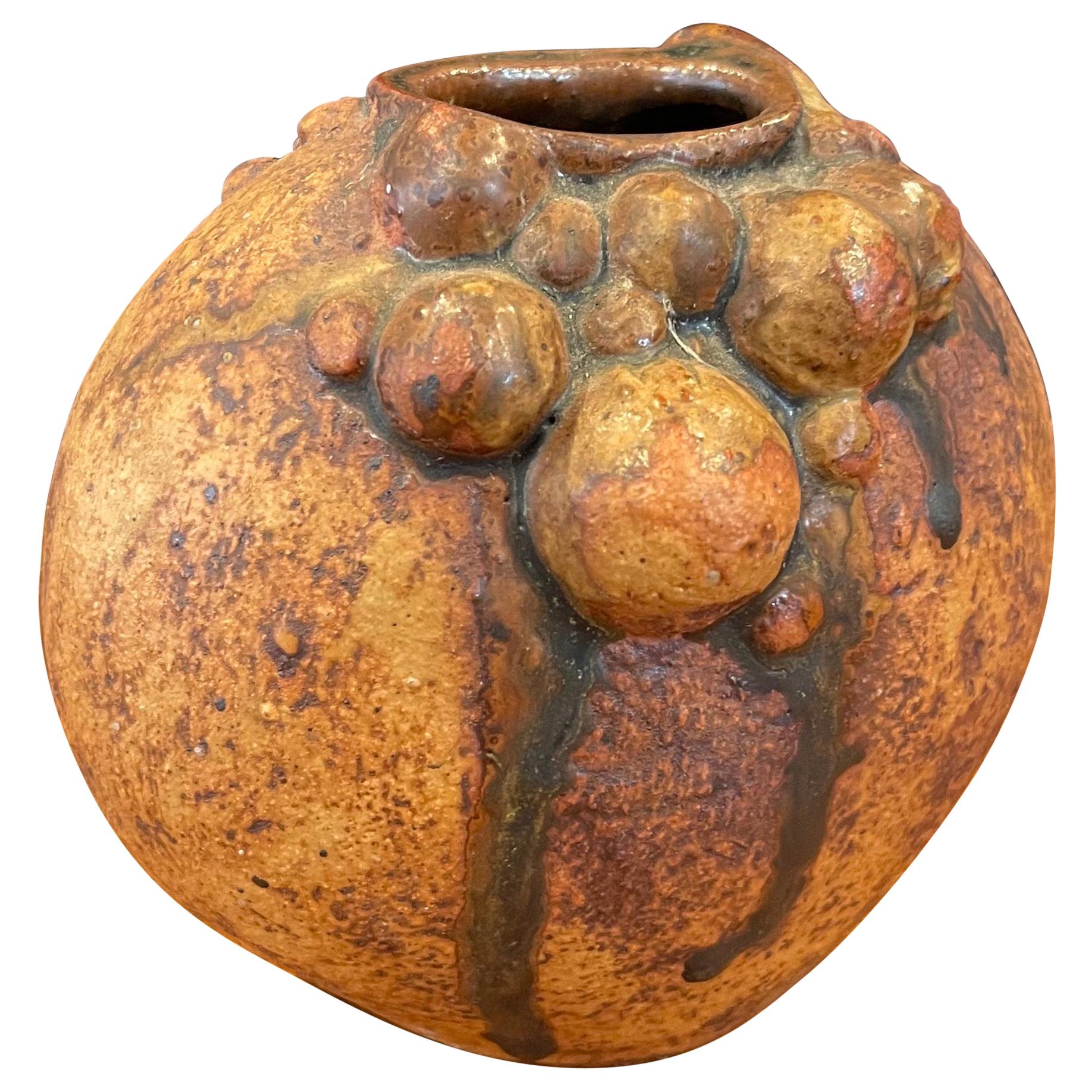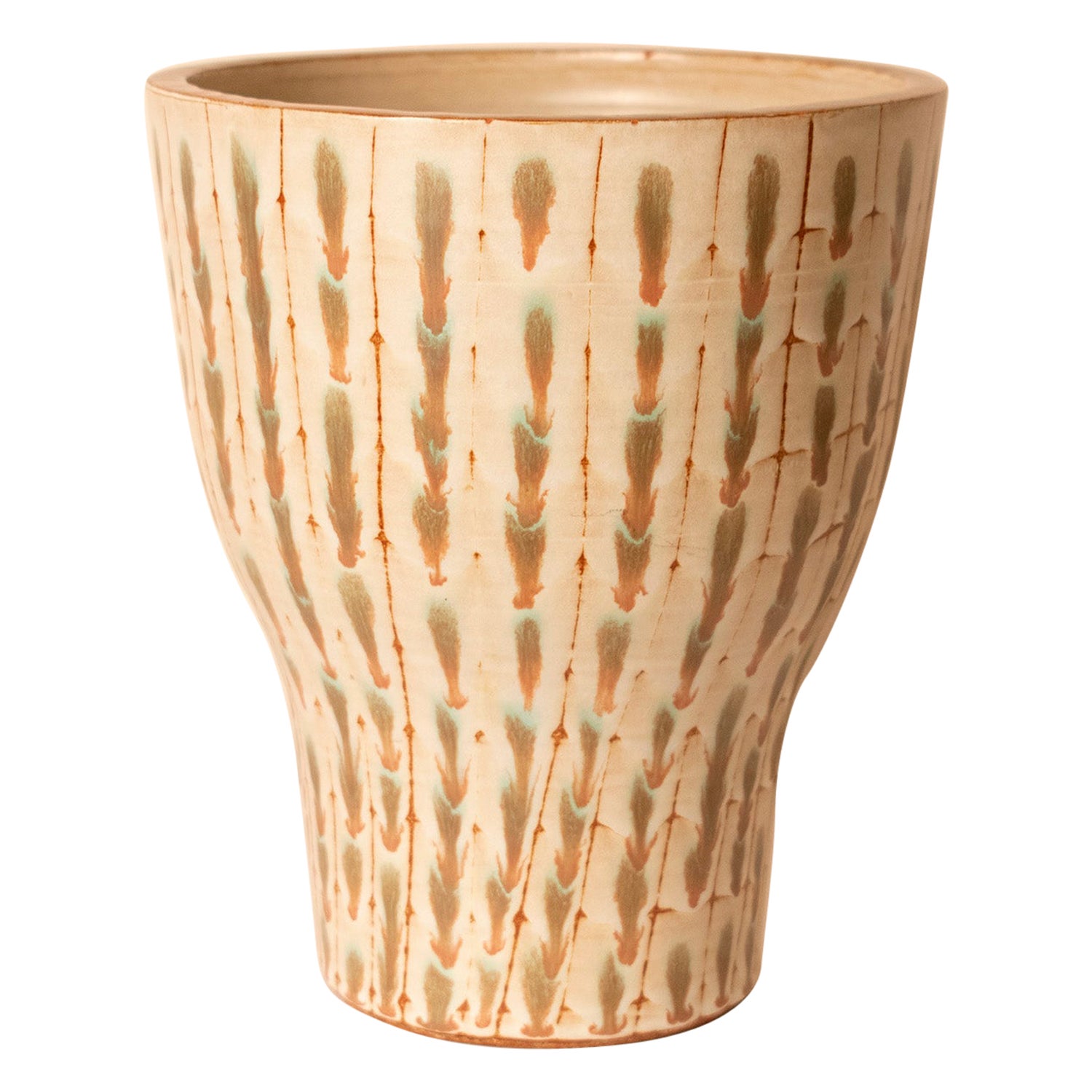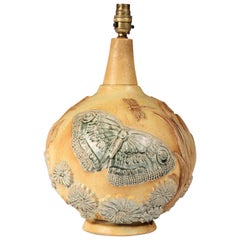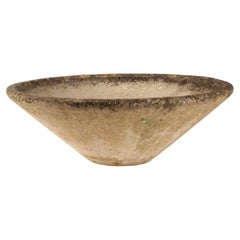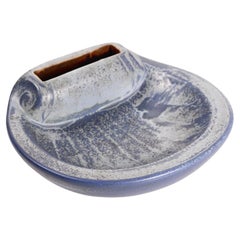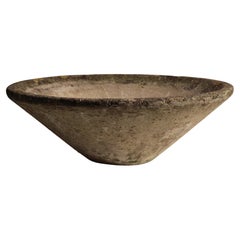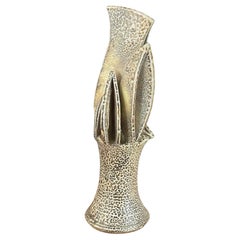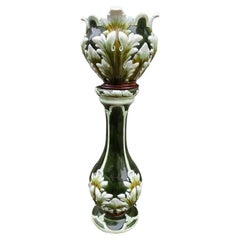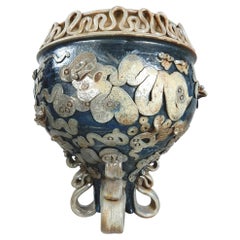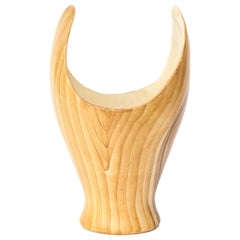Items Similar to Mid Century Modern Ceramic Jardinière by Bernard Rooke
Want more images or videos?
Request additional images or videos from the seller
1 of 12
Mid Century Modern Ceramic Jardinière by Bernard Rooke
$477.16
£348
€405.87
CA$653.40
A$726.49
CHF 379.33
MX$8,843.14
NOK 4,840.12
SEK 4,534.96
DKK 3,029.05
Shipping
Retrieving quote...The 1stDibs Promise:
Authenticity Guarantee,
Money-Back Guarantee,
24-Hour Cancellation
About the Item
An organic and Brutalist style Jardine which would work perfectly with trailing foliage.
Bernard Rooke (born 1938) is a British artist and studio potter. Rooke has exhibited his "Brutalist" ceramics and painting both in the UK and abroad with work in many collections both public and private including the Victoria and Albert Museum, Cleveland Museum of Art, Nuffield Foundation, Röhsska Museum in Sweden and the Trondheim Kunstmuseum in Norway.
Bernard Rooke attended Ipswich School of Art studying painting and lithography before going on to study at Goldsmiths College of Art. It was while studying here that he decided to take up pottery. Although unfamiliar with this craft and tradition, he found that working with clay provided new opportunities for freedom of interpretation and creativity.
In 1960 Rooke set up his first pottery in Forest Hill in South London along with Alan Wallwork. It was a very small room with enough space for a small electric kiln. He was initially using mainly hand building, coiling, blocking and slabbing techniques. While researching ideas, he was supporting himself by part-time lecturing at London University, Goldsmiths College and St Mary's College. In addition, Rooke's membership of 'The Craftsman Potters' Association' enabled him to show his work in a shop in Carnaby Street in London.
In 1967, both the need for a larger working space and becoming disillusioned with living in London spurred Rooke into moving out of the city and to an old mill building in Swilland in Suffolk. Rooke wanted to widen the range of work so as to become more commercial. With the birth of his son, Aaron, and much needed work to be done on the mill, it was important to be able to make a living.
In 1968, the Grand Metropolitan Hotel commissioned Rooke to make 120 standard lamps, 120 table lamps as well as a 24 foot long ceramic mural and another 9 foot high, which incorporated interior lighting. The money from the commission helped to pay for much needed restoration work on the mill.
By the 1970s, a gallery space was opened in the windmill and run by Susan Rooke, Bernard's wife, selling work to locals and tourists as well as to American airmen based nearby. The vision for Mill Gallery was beginning to develop and alongside this a reputation was building bringing in a good source of income.
Sons Aaron and Felix were becoming more involved with the running of the pottery, giving Bernard more time to develop new ideas and designs and more time to continue with his painting. In 2004, the Rooke family decided not to sell to the public through the gallery anymore and close the pottery to concentrate more on painting and printmaking.
In 2017 Bernard's lighting was featured in the Exhibition: “Glass, Light, Paint & Clay” at the Peterborough Museum and Art Gallery. The exhibition featured four artists: Bernard Rooke, John Maltby, Duncan Clarke and Sam Herman selected from the Graham Cooley collection. The catalogue (ISBN 978-1-78808-185-6) features an interview with Bernard in which he describes his life and work.
- Creator:Bernard Rooke (Maker)
- Dimensions:Height: 18.9 in (48 cm)Diameter: 8.27 in (21 cm)
- Style:Brutalist (Of the Period)
- Materials and Techniques:
- Place of Origin:
- Period:
- Date of Manufacture:1970s
- Condition:Wear consistent with age and use. Will accommodate a pot of 15cm diameter.
- Seller Location:London, GB
- Reference Number:1stDibs: LU2868316368192
About the Seller
5.0
Platinum Seller
Premium sellers with a 4.7+ rating and 24-hour response times
Established in 2015
1stDibs seller since 2017
194 sales on 1stDibs
Typical response time: 1 hour
- ShippingRetrieving quote...Shipping from: Maldon, United Kingdom
- Return Policy
Authenticity Guarantee
In the unlikely event there’s an issue with an item’s authenticity, contact us within 1 year for a full refund. DetailsMoney-Back Guarantee
If your item is not as described, is damaged in transit, or does not arrive, contact us within 7 days for a full refund. Details24-Hour Cancellation
You have a 24-hour grace period in which to reconsider your purchase, with no questions asked.Vetted Professional Sellers
Our world-class sellers must adhere to strict standards for service and quality, maintaining the integrity of our listings.Price-Match Guarantee
If you find that a seller listed the same item for a lower price elsewhere, we’ll match it.Trusted Global Delivery
Our best-in-class carrier network provides specialized shipping options worldwide, including custom delivery.More From This Seller
View AllMid-Century Modern Brutalist Ceramic Table Lamp by Bernard Rooke
By Bernard Rooke
Located in London, GB
An organic and Brutalist style Butterly table lamp. No chips or cracks. Easily retired for all regions.
Bernard Rooke (born 1938) is a British artist and studio potter. Rooke has exhibited his "Brutalist" ceramics and painting both in the UK and abroad with work in many collections both public and private including the Victoria and Albert Museum, Cleveland Museum of Art, Nuffield Foundation, Röhsska Museum in Sweden and the Trondheim Kunstmuseum in Norway.
Bernard Rooke attended Ipswich School of Art studying painting and lithography before going on to study at Goldsmiths College of Art. It was while studying here that he decided to take up pottery. Although unfamiliar with this craft and tradition, he found that working with clay provided new opportunities for freedom of interpretation and creativity.
In 1960 Rooke set up his first pottery in Forest Hill in South London along with Alan Wallwork. It was a very small room with enough space for a small electric kiln. He was initially using mainly hand building, coiling, blocking and slabbing techniques. While researching ideas, he was supporting himself by part-time lecturing at London University, Goldsmiths College and St Mary's College. In addition, Rooke's membership of 'The Craftsman Potters' Association' enabled him to show his work in a shop in Carnaby Street in London.
In 1967, both the need for a larger working space and becoming disillusioned with living in London spurred Rooke into moving out of the city and to an old mill building in Swilland in Suffolk. Rooke wanted to widen the range of work so as to become more commercial. With the birth of his son, Aaron, and much needed work to be done on the mill, it was important to be able to make a living.
In 1968, the Grand Metropolitan Hotel commissioned Rooke to make 120 standard lamps, 120 table lamps as well as a 24 foot long ceramic mural and another 9 foot high, which incorporated interior lighting. The money from the commission helped to pay for much needed restoration work on the mill.
By the 1970s, a gallery space was opened in the windmill and run by Susan Rooke, Bernard's wife, selling work to locals and tourists as well as to American airmen based nearby. The vision for Mill Gallery was beginning to develop and alongside this a reputation was building bringing in a good source of income.
Sons Aaron and Felix were becoming more involved with the running of the pottery, giving Bernard more time to develop new ideas and designs and more time to continue with his painting. In 2004, the Rooke family decided not to sell to the public through the gallery anymore and close the pottery to concentrate more on painting and printmaking.
In 2017 Bernard's lighting was featured in the Exhibition: “Glass, Light, Paint & Clay” at the Peterborough Museum and Art Gallery. The exhibition featured four artists: Bernard Rooke, John Maltby...
Category
Vintage 1970s English Brutalist Table Lamps
Materials
Clay
Willy Guhl Inspired Concrete Planter in Cone Shape Made in England, 1960’s
By Willy Guhl
Located in London, GB
Mid-Century Modern Concrete Planter – 1960s English Design
Discover this exquisite Mid-Century Modern concrete planter from England, dating ba...
Category
Vintage 1960s English Mid-Century Modern Planters, Cachepots and Jardini...
Materials
Concrete
Large Rörstrand Ashtray by Gunnar Nylund, 1950s Swedish Ceramic, Organic Form
By Rörstrand, Gunnar Nylund
Located in London, GB
Large Rörstrand Ashtray by Gunnar Nylund, 1950s Swedish Ceramic, Organic Form
A striking large ashtray, shell-like in its design, produced by the esteemed Swedish ceramic maker Rörs...
Category
Vintage 1950s Swedish Scandinavian Modern Ashtrays
Materials
Ceramic
Willy Guhl inspired concrete Planter in cone shape made in England 1960’s
By Willy Guhl
Located in London, GB
Mid-Century Modern Concrete Planter – 1960s English Design
Discover this exquisite Mid-Century Modern concrete planter from England, dating ba...
Category
Vintage 1960s English Mid-Century Modern Planters and Jardinieres
Materials
Concrete
Bernard Rooke Brutalist Dragon Fly and Leaf Floor Lamp Organic Style 1960-1970
By Bernard Rooke
Located in London, GB
An organic and Brutalist style Floor Lamp with Dragon Fly and Leaf design. No chips or cracks. Easily rewired for all regions.
Bernard Rooke (born 1938) is a British artist and studio potter. Rooke has exhibited his "Brutalist" ceramics and painting both in the UK and abroad with work in many collections both public and private including the Victoria and Albert Museum, Cleveland Museum of Art, Nuffield Foundation, Röhsska Museum in Sweden and the Trondheim Kunstmuseum in Norway. Bernard Rooke attended Ipswich School of Art studying painting and lithography before going on to study at Goldsmiths College of Art. It was while studying here that he decided to take up pottery. Although unfamiliar with this craft and tradition, he found that working with clay provided new opportunities for freedom of interpretation and creativity. In 1960 Rooke set up his first pottery in Forest Hill in South London along with Alan Wallwork. It was a very small room with enough space for a small electric kiln. He was initially using mainly hand building, coiling, blocking and slabbing techniques. While researching ideas, he was supporting himself by part-time lecturing at London University, Goldsmiths College and St Mary's College. In addition, Rooke's membership of 'The Craftsman Potters' Association' enabled him to show his work in a shop in Carnaby Street in London. In 1967, both the need for a larger working space and becoming disillusioned with living in London spurred Rooke into moving out of the city and to an old mill building in Swilland in Suffolk. Rooke wanted to widen the range of work so as to become more commercial. With the birth of his son, Aaron, and much needed work to be done on the mill, it was important to be able to make a living. In 1968, the Grand Metropolitan Hotel commissioned Rooke to make 120 standard lamps, 120 table lamps as well as a 24 foot long ceramic mural and another 9 foot high, which incorporated interior lighting. The money from the commission helped to pay for much needed restoration work on the mill. By the 1970s, a gallery space was opened in the windmill and run by Susan Rooke, Bernard's wife, selling work to locals and tourists as well as to American airmen based nearby. The vision for Mill Gallery was beginning to develop and alongside this a reputation was building bringing in a good source of income. Sons Aaron and Felix were becoming more involved with the running of the pottery, giving Bernard more time to develop new ideas and designs and more time to continue with his painting. In 2004, the Rooke family decided not to sell to the public through the gallery anymore and close the pottery to concentrate more on painting and printmaking. In 2017 Bernard's lighting was featured in the Exhibition: “Glass, Light, Paint & Clay” at the Peterborough Museum and Art Gallery. The exhibition featured four artists: Bernard Rooke, John Maltby...
Category
Vintage 1960s English Brutalist Floor Lamps
Materials
Pottery
Scandinavian Modern Swedish Bowl by Carl Harry Stalhane and Maker Rorstrand
By Carl-Harry Stålhane, Rörstrand
Located in London, GB
Swedish ceramic artist Carl-Harry Stålhane (1920- 1990) played a major role in popularizing Swedish pottery during the 20th century, working for more than three decades at Rörstrand, one of the oldest ceramics manufacturers in Europe. During his long tenure at Rörstrand, Stålhane was responsible for small-batch studio pieces, mass-produced tableware , and all manner of decorative accessories .
Born in 1920 in Mariestad, Sweden, Stålhane began working at Rörstrand in 1939 as a decorative painter, assisting Danish-Finnish ceramic artist, designer, and sculptor Gunnar Nylund (1904-1997). During this time, Stålhane decorated various ceramic pieces, most notably Nylund’s Flambé range (1939s), quickly establishing himself as a talented ceramic artist. Inspired by the desire for new products during the postwar economic boom, Stålhane went from being a talented decorator to an exceptional ceramic artist.
In 1943, Stålhane caught the eye of Swedish artist Isaac Grünewald (1889-1946), who was visiting Rörstrand. Grünewald was so impressed with Stålhane’s work that he took him on as a student, and from 1943 to 1946, Stålhane studied art at Grünewald's Art School in Stockholm. Subsequently from 1947 until 1948, he studied sculpture at Académie Colarossi in Paris.
During the 1950s, Stålhane’s work appeared in several solo exhibitions in Sweden, the United Kingdom, and the United States. His Blanca Tableware range (c. 1955) won numerous international prizes and was in high-demand. In 1958, Stålhane succeeded Nylund as Artistic Director and Chief Designer at Rörstrand.
In 1960, Stålhane unveiled a new collection at Stockholm’s Galerie Blanche. Featuring dark stoneware pieces made from local clays, this collection represented a bold departure from the soft, restrained shapes of the 1950s. It has since been praised for its precient aesthetic that would influence the look of ceramics for more than a decade.
From 1963 until 1971, Stålhane taught ceramics at the Art Industrial School in Gothenburg. For a short time, he also was the Design Director at the Swedish factory Upsala Ekeby, which in addition to porcelain, produced tile, brick, and glass.
Stålhane eventually left Rörstrand in 1973 in order to establish his own ceramic company, Designhuset, in Lidköping, where he further experimented with local clays and minerals. Stålhane continued to work until his death in 1990. Today, Designhuset is a school for ceramists and model-makers.
Over the course of his career, Stålhane created several public works for The Commerce Trust Company in Kansas City, Missouri, and for Volvo in Gothenburg, Sweden. His work is represented at several international museums, including Stockholm’s Nationalmuseum and New York’s MoMA.
Rörstrand is the second oldest brand of ceramics in Europe and can be found in homes all across Sweden and Europe. Rörstrand’s long legacy includes some of Europe’s most iconic ceramics collections including Swedish Grace, Mon Amie, Ostindia, Filippa...
Category
Vintage 1950s Swedish Scandinavian Modern Ceramics
Materials
Ceramic, Stoneware, Pottery
You May Also Like
California Studio Pottery Ikebana Vase
Located in San Diego, CA
California studio pottery signed ikebana vase with multiple openings, circa 1960s. This very unique piece measures: 4.5" D x 14.5" H and is signed on the ...
Category
Mid-20th Century American Mid-Century Modern Planters, Cachepots and Jar...
Materials
Pottery
$300 Sale Price
20% Off
Jardinière on Stand Ceramic Decorative Planter
Located in Antwerp, BE
French Ceramic Pedestal with Matching Planter – Mid-20th Century
This exceptional ceramic pedestal with planter, also referred to as a cachepot or jardinière, is a refined example o...
Category
Mid-20th Century French Mid-Century Modern Planters and Jardinieres
Materials
Ceramic
$5,036 / set
Don Reitz Studio Pottery Sculpture Vessel
By Don Reitz
Located in Las Vegas, NV
Mid-Century Don Reitz studio art pottery vessel.
Circa late 1960s, measuring 23 inches tall x 20 inches wide. Weighs approximate 70lbs.
Unsigned, as far as I can find, but unmistakab...
Category
Mid-20th Century American Mid-Century Modern Planters, Cachepots and Jar...
Materials
Pottery
Faux Bois Ceramic Vase by Grandjean Jourdan, Vallauris, France, c. 1960 (Signed)
By Grandjean Jourdan
Located in New York City, NY
Faux Bois Ceramic Vase by Grandjean Jourdan, Vallauris, France, c. 1960s (Signed)
This vase displays the acclaimed French ceramicist's trademark "faux bois," or imitation wood, fin...
Category
Vintage 1960s French Mid-Century Modern Vases
Materials
Ceramic
Brutalist Earthenware Pottery Vase by Bernard Rooke
By Bernard Rooke
Located in San Diego, CA
A very nice Brutalist earthenware pottery vase by Bernard Rooke, circa 1970s. The piece is in very good vintage condition with no chips, cracks or crazing and measures 5.5" W x 4" D ...
Category
Mid-20th Century American Mid-Century Modern Vases
Materials
Earthenware
$380 Sale Price
20% Off
Mid-20th Century Spanish Ceramic Planter Jardiniere by Jordi Aiguade.
Located in Barcelona, Cataluna
It is a ceramic piece by a renowned Catalan ceramist, Jordi Aiguadé.
Jordi Aguadé i Clos (Barcelona, 1925 – May 22, 2021) was a Catalan ceramist.[1] A reference in contemporary Cat...
Category
Vintage 1960s Spanish Mid-Century Modern Planters, Cachepots and Jardini...
Materials
Ceramic
$584 Sale Price
25% Off
More Ways To Browse
Jardiniere Set
Midcentury Ceramic Planter
Large Mid Century Modern Planter
Large Ceramic Jardinieres
Large Garden Pottery
Mid Century Brutalist Ceramics
Mid Century Modern Art Mural
Large Midcentury Ceramic Planter
Norwegian Ceramic
Mid Century Ceramic Lamps Brutalist
Brutalist Art Pottery
Large Clay Planter
Mid Century Brutalist Painting
Weller Pottery Garden
Vintage Lamp Coiled
South America Pottery
Planter Lamp Vintage
Garden City Pottery
